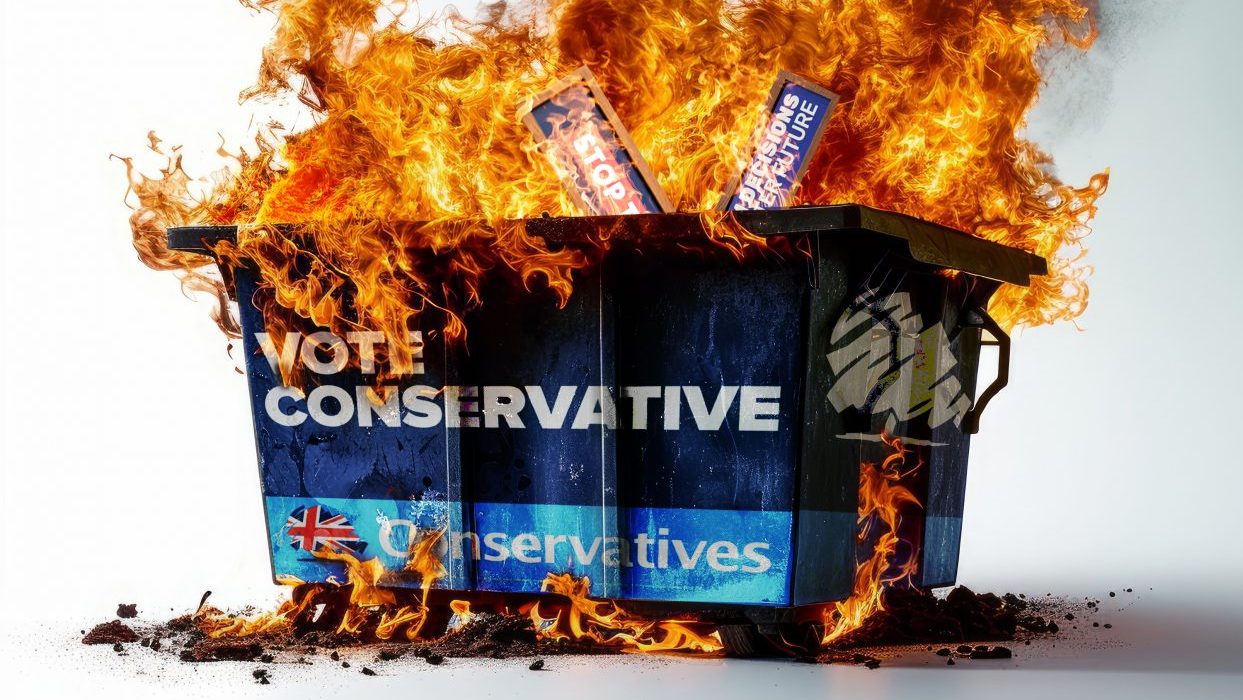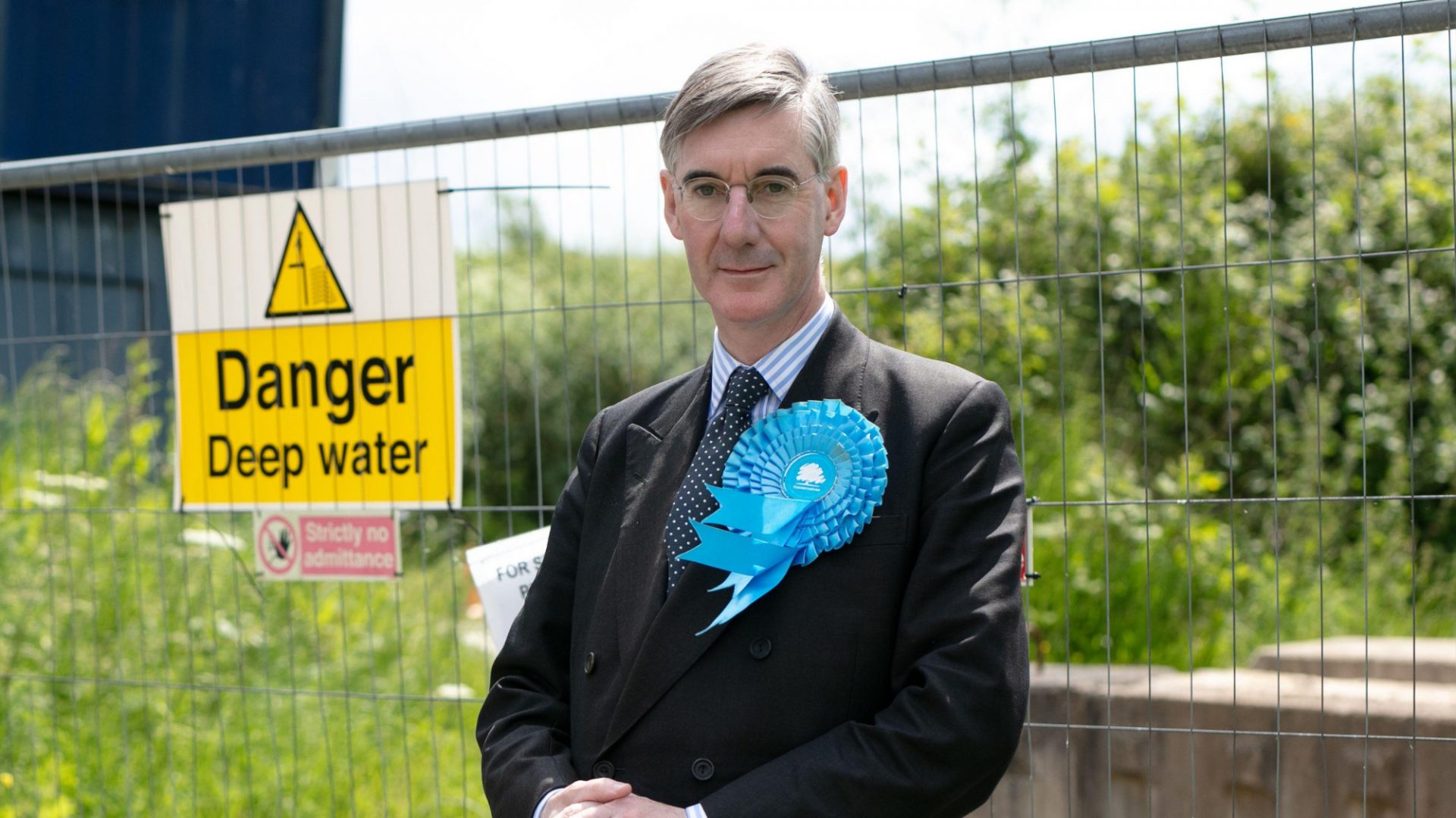The most common nightmare – one exacerbated by stress – is to dream that we’re falling. No matter what we try to cling to, or however we try to stop ourselves, we inevitably plummet, as if we’re going to fall for ever, before waking with a jolt.
Unfortunately for Rishi Sunak, this is not a bad dream: he is falling, further and faster with every day, and there seems to be nothing that can slow him down.
Everyone knew this would be a bad election for Sunak and the Conservative Party. Losing seats was seen as inevitable and a defeat was all but baked in.
The expectations were, then, low for the prime minister at least – all he had to do was time and run the election so as to avoid a 1997-style wipeout and he would, in time, be judged to have played a bad hand well.
That is, of course, not what has happened. At every single step where the Conservatives had any degree of influence over their fate, they made the wrong choice. The party has barely had a single good moment in the first month of the election campaign. In its final week, its fate seems sealed.
Sunak first ruled out a summer election and told reporters to take their holidays, before calling a “surprise” July 4 election – which was rapidly revealed to have thrown Conservative HQ far more off balance than it did Labour.
That waterlogged campaign launch now looks like a high spot. The first few weeks of the campaign saw Sunak announce policies for which he’d done no groundwork, interspersed with gaffes of varying magnitude.
These gaffes mounted until the still inexplicable decision to leave an international D-day event attended by Joe Biden and Volodymyr Zelensky – a great chance to look statesmanlike – with so little in the calendar that an ITV interview was scheduled in the time he freed up. As election gaffes go, this would usually be insurmountable.
The last hope that the timing might somehow work to the Tories’ benefit was dashed when Nigel Farage announced he would return as the leader of the Reform party and stand for election in Clacton.
Sunak’s “moronic” (to quote a former Conservative cabinet minister) decision to centre the impossible prospect of stopping small boat crossings in his priorities as prime minister and then the grounds on which to fight the election has helped Farage build momentum to the point that Reform could conceivably collect more votes than the Conservatives, even though they would still pick up only a tiny handful of seats.
The Tory Party is barely raising any money from donors, and is being outspent online by Labour by at least two-to-one, suggesting its campaign is out of cash. The polls were suggesting a 1997-style outcome – in which the party got 165 seats – as a worst-case scenario. Now a defeat of that scale seems to be their best hope.
Against all of that misery came a totally self-inflicted wound: another probity scandal. Four people close to Sunak are now accused of placing bets on the timing of the election (some deny doing so), while the Gambling Commission is investigating “several dozen” more.
This reopens every wound the Conservatives hoped had healed in the wake of Partygate: Tories filling their own pockets, breaking the rules and potentially even the law, and generally acting like self-serving spivs.
Sunak himself took three days to say he was angry about the conduct of his team – let alone to apologise for it – suggesting that he waited until it was a bigger story before being disappointed in the alleged lawbreaking of the team he leads. Morale among Conservative staff and volunteers was already at an all-time low. It is now rock-bottom.
These are the kind of elections that kill political parties. Something called the Conservative Party will still exist on July 5, but it will look nothing like the “natural party of government” in temporary exile.
Its exact shape in parliament will depend on which MPs keep their seats, which with swings this significant is almost impossible to predict. But it has no agreed core, no reputation for competence, almost no money, and very little from which to rebuild.
Instead, it will have Farage – probably finally an MP himself, on his eighth attempt – invigorated as he has never been before, telling Conservative voters, members and MPs alike that his empty, nationalist, populist nonsense is the future of the right. With so little else on offer, many of them might believe him.
Even coverage could quickly ebb away from the Conservatives, but it will take a while. The majority of Westminster correspondents have more sources in the Conservative Party than anywhere else put together – outside of election time, it’s the government that makes the news, and the Tories have been in power for 14 years. The tendency among columnists is the same.
Given that, out of sheer muscle memory if nothing else, there will be a lot of focus on the Conservative leadership contest, but then… what? A rump of less than 100 MPs will struggle to make news in any way that actually has an impact on anything beyond the party. Newspaper editors will want to move on, even if individual reporters and columnists don’t.
All of this could be accelerated dramatically if the Conservatives were not the official opposition. This has gone in the space of weeks from a fun thought experiment to a serious possibility. If figures within the Liberal Democrats and Labour alike are not mapping out what a Lib Dem opposition would look like, they are being negligent.
It must be stressed that a Lib Dem opposition is still very much an unlikely outcome: almost all of the party’s top 50 target seats are held by the Conservatives. That means a total of 50-60 Lib Dem MPs is a feasible, even probable outcome of the 2024 election.
The issue for the Lib Dems is that most of their next 50 target seats are held by Labour, and they are vanishingly unlikely to take any of them. That means that a seat total of 65 or 70 is the absolute best of best-case scenarios for them.
It would be unprecedented and bizarre for the official opposition to hold only around one in 10 seats in parliament (Labour after the 2019 election had just under one in three seats). But this is the outcome that some polls, and the Ipsos MRP projection, suggest is possible – unofficially, those working on the various models say they are getting worse for the Tories every day.
The Lib Dems would get an extra £1m in funding a year – and the Conservatives lose the same – for being the official opposition, and they would get the automatic first response to most Commons debates. Notably, at PMQs, it would be Ed Davey opposite Keir Starmer at the dispatch box, rather than whoever is landed with the wreckage of the Tories.
This could change the nature of the debate on issues such as European cooperation and immigration, but it would cause significant legitimacy headaches for parliament. In terms of votes cast, the Lib Dems will probably come fourth – with the Tories and Reform in second and third, though not necessarily that way around.
If those two parties collectively polled above 30% but didn’t form the opposition, they would probably want to cry foul as to the representativeness of parliament, in some cases becoming new converts to a cause championed by parties of the left for some time.
According to the letter of the rules, the opposition is decided based on the number of seats a party wins, not votes. But given that the Lib Dems have championed voting system reform for decades, they would no doubt wish to use their platform to raise that cause (Farage will doubtless seek to raise it too, claiming that Reform should have won many more seats than it did).
This is one of many headaches that would face an incoming Labour administration, should it have the kind of huge majority the polls suggest: how not to look dictatorial while also not making major concessions to a historically weak opposition.
Labour is an extremely broad-church party, one that by its nature would not survive a shift to proportional representation – why would its various factions stay together when they could form more focused parties and do their dealmaking after an election, rather than before?
Asking Labour to introduce a new electoral system would essentially be asking it to overturn the very system that had given it a landslide, and to introduce one that would spell the death of the party to boot.
But it surely could not ignore the sheer unrepresentativeness of Westminster politics in a world where the Tories collapse to below 100 seats, even if they manage to avoid the precipice of being ejected not just from government, but opposition too. Navigating that legitimacy challenge is going to be a serious and sober task.
Sadly for the disintegrating Tory Party, they are no longer associated with either seriousness or sobriety.
Five years ago, the party looked like an immovable force in British political life. Will there be any room for them at all five years hence?




